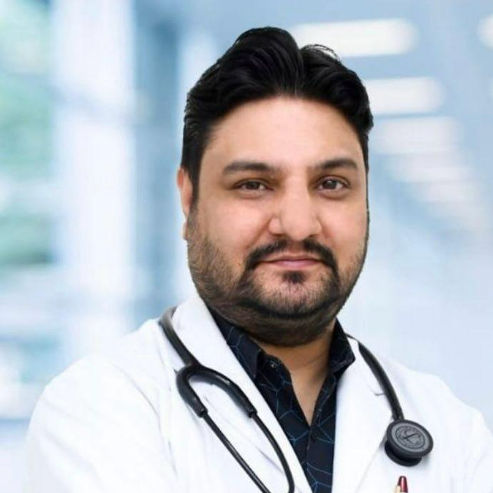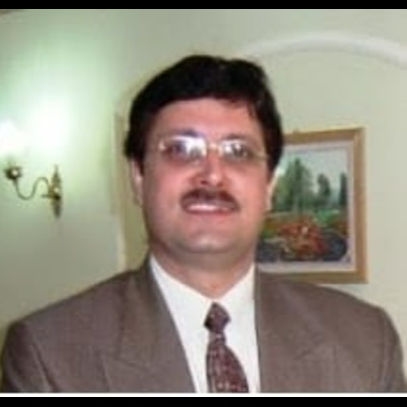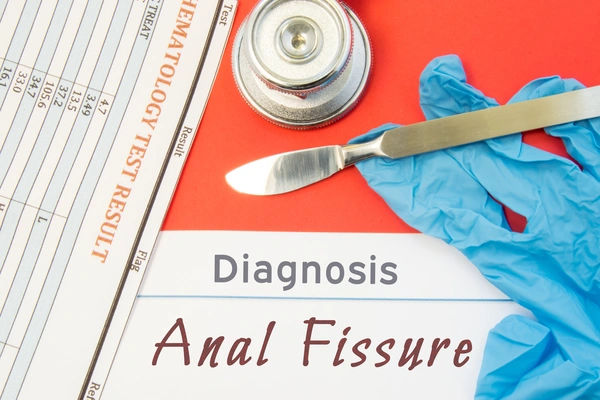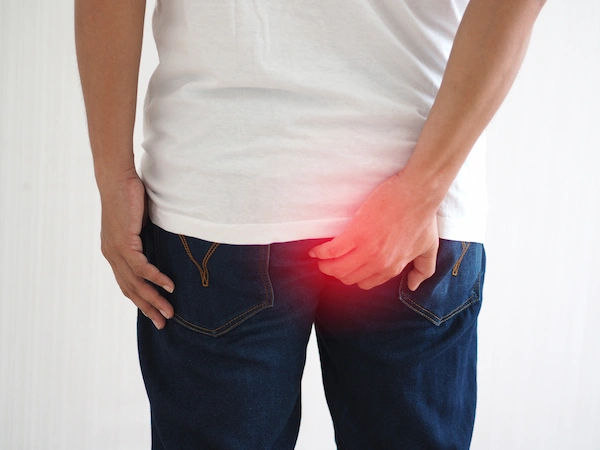Anal Fissure Treatment
Learn about anal fissures, its symptoms, causes and remedies. Explore conservative, medicinal, and surgical options and prevention strategies to promote healing.

Written by Dr Sonia Bhatt
Last updated on 13th Jan, 2026
Anal fissures are tiny tears in the lining of the anus, causing pain, discomfort, and bleeding during bowel movements. This condition is primarily triggered by chronic constipation, passing hard tools, excessive straining during defection and prolonged diarrhoea. Additionally, in some cases, inflammatory bowel disease (IBD) can also be one of the reasons behind this health issue. An anal fissure is a distressing condition, but with effective treatment and preventive measures, one can easily recover from it.
Symptoms of Anal Fissures
Recognising the signs of anal fissure is essential for getting treatment right away and avoiding problems. If the right care is received, the pain and bleeding associated with this condition can be managed effectively.
- Bowel Pain: The most obvious sign of an anal fissure is pain during bowel movements. After going to the bathroom, this sharp, cutting pain can last for hours.
- Bleeding: Anal fissures often show up as fresh, red blood in the toilet or in poop. Furthermore, itching and burning feelings in the anal area are other signs.
- Anal Spasms: Pain and bleeding are common with cracks, but muscle twitches around the anus are also common. This makes the pain even worse.
Consult Top General Gastroenterologist
Diagnosis of Anal Fissures
Getting the right diagnosis is very important for treatment to work. A physical check is often enough for a doctor to prove the presence of an anal fissure. As part of a physical check, the doctor may gently separate the anal cheeks to look at the anus for cracks.
When a physical check isn't enough to rule out other diseases, like haemorrhoids or anal cancer, it may be necessary to do more tests. These include an anoscopy, where a small instrument is used to examine the anal canal, or a sigmoidoscopy/colonoscopy to rule out underlying conditions such as Crohn’s disease or colorectal disorders.
Conservative Treatment Options
Instead of surgery, many people can fix their anal fissures with non-invasive methods. Here are some suggestions –
- Dietary Changes and Fibre Intake: Increasing fibre intake helps prevent constipation and makes bowel movements easier. Consuming plenty of fruits, vegetables, and whole grains improves stool quality and promotes better digestive health.
- Warm Baths and Topical Treatments: Soaking the lower back in warm water for 10 to 15 minutes several times daily can help ease pain and speed up healing.
- Lifestyle Modifications: Besides dietary changes, managing stress and adopting other lifestyle adjustments like exercises can help prevent anal fissures and promote faster healing of existing ones.
- Over-the-counter Ointments: Using over-the-counter creams and ointments with hydrocortisone or lidocaine can temporarily relieve pain and swelling. These items also protect against further discomfort.
- Prescription Medications: If the problem lasts for a long time, a doctor may give medicine like nitroglycerin cream or calcium channel blockers to help relax the anal muscle and get more blood to the area.
- Botox Injections: Some people use Botox shots to relax the anal sphincter and let the cleft heal. This can help with pain and spasms.
Surgical Treatment Options
Even though most anal fissures heal on their own, some may need surgery to fix recurrent fissures that won't heal. Surgery can help people who are in constant pain and discomfort for a long time.
The doctors perform Lateral Internal Sphincterotomy, where they make a small cut in the anal sphincter is part of this process. This lowers muscle stress, which helps the crack heal. According to estimates, it works about 90% of the time, making it very successful. In some cases, individuals may require additional treatments, such as a skin flap or patch, to promote healing and repair any damage to the anal canal.
Even though surgery works very well, there are some risks, such as infection, incontinence, and cracks coming back.
Complications of Untreated Anal Fissures
When left untreated, anal fissure can lead to persistent pain and additional complications like:
Chronic Fissures
Chronic anal fissures occur when the condition doesn't heal after 8 weeks. This condition can cause prolonged pain and muscle cramps and significantly reduce an individual's quality of life, affecting his/her well-being.
Fistulas
If an anal crack doesn't heal, it can sometimes turn into an anal fistula, which is a strange opening between the anus and the skin around it. Fixing a fistula usually requires surgery.
Anal Stenosis
Chronic fissures can make the anal canal narrow, which is also known as anal stenosis. This can make it hard to go to the toilet, and they may need more medical care.
Prevention of Anal Fissures
It is possible to prevent the occurrence of anal fissures with a few lifestyle adjustments:
Healthy Bowel Habits
Regular bowel movements are one of the best ways to avoid constipation and keep anal cracks from appearing.
When someone feels the need to use the toilet, they should avoid holding it in and instead go slowly to prevent injury.
Importance of Hydration
Drinking plenty of water helps keep stools soft and prevents constipation, reducing the risk of anal fissures. Staying hydrated also benefits overall gut health, supports proper digestion, and prevents related issues.
Proper Hygiene
It is essential to keep the anal area clean and dry to avoid getting an infection or discomfort, both of which can make cracks more likely to form.
Prognosis and Recovery
Most anal fractures heal on their own and have a favourable outlook. Here is more on the prognosis of the condition –
- Healing Time: Acute anal fractures heal in days to weeks. Chronic crack surgery can take months to heal.
- Long-Term Results: If treated properly, most anal crack patients will recover. If untreated, persistent cracks may recur.
- Medical Aid When Needed: If an anal crack lasts more than a few weeks or causes major discomfort, bleeding, or other issues, it is important to consult a doctor.
Lifestyle and Home Remedies
Adopting lifestyle changes and home remedies can help prevent and heal anal fissures. Small modifications to diet, hygiene, and routines may have a tremendous effect.
- Exercise and Nutrition Importance: Consuming fibre-rich diets and being active helps prevent constipation and regularises bowel movements, lowering the incidences of anal fissures.
- Other Home Remedies: In addition to diet, warm baths, skin ointments, and gentle cleaning can reduce pain and expedite recovery. The environment around the patient must also be quiet and stress-free.
Conclusion
Anal fissures are a painful and distressing condition, but with the right treatment and preventive measures, recovery is possible. Early diagnosis and a combination of conservative treatments, including dietary changes, lifestyle modifications, and topical medications, can help manage symptoms and promote healing. But, for the more severe cases, surgery is the only option. With a holistic approach, including medical treatment, home remedies and lifestyle changes, people can get over it and lead painless lives.
Consult Top General Gastroenterologist
Consult Top General Gastroenterologist

Dr. B Prabhakar
Gastroenterology/gi Medicine Specialist
21 Years • MD, DM (GE)
Hyderguda
Apollo Hospitals Hyderguda, Hyderguda

Dr. Lekkala Rajesh
Gastroenterology/gi Medicine Specialist
12 Years • MBBS, DNB Internal Medicine DrNB Medical Gastroenterology and Hepatology | Medical Gastroenterology
Secunderabad
Apollo Hospitals Secunderabad, Secunderabad
(75+ Patients)

Dr. Jatin Yegurla
Gastroenterology/gi Medicine Specialist
11 Years • MD (PGI), DM (AIIMS Delhi), FAGIE (AIIMS Delhi), ESEGH (UK), Gold Medalist
Hyderabad
Apollo Hospitals Jubilee Hills, Hyderabad
(650+ Patients)

Dr. Amit Pandita
Gastroenterology/gi Medicine Specialist
10 Years • MBBS. MD (INTERNAL MEDICINE) DrNB (GASTROENTEROLOGY AND HEPATOLOGY)
Delhi
Apollo Hospitals Indraprastha, Delhi

Dr. Sunil Kaul
General Surgeon
30 Years • MBBS, MS, FICS, FIMSA, FMAS
Delhi
Apollo Hospitals Indraprastha, Delhi
(25+ Patients)
Consult Top General Gastroenterologist

Dr. B Prabhakar
Gastroenterology/gi Medicine Specialist
21 Years • MD, DM (GE)
Hyderguda
Apollo Hospitals Hyderguda, Hyderguda

Dr. Lekkala Rajesh
Gastroenterology/gi Medicine Specialist
12 Years • MBBS, DNB Internal Medicine DrNB Medical Gastroenterology and Hepatology | Medical Gastroenterology
Secunderabad
Apollo Hospitals Secunderabad, Secunderabad
(75+ Patients)

Dr. Jatin Yegurla
Gastroenterology/gi Medicine Specialist
11 Years • MD (PGI), DM (AIIMS Delhi), FAGIE (AIIMS Delhi), ESEGH (UK), Gold Medalist
Hyderabad
Apollo Hospitals Jubilee Hills, Hyderabad
(650+ Patients)

Dr. Amit Pandita
Gastroenterology/gi Medicine Specialist
10 Years • MBBS. MD (INTERNAL MEDICINE) DrNB (GASTROENTEROLOGY AND HEPATOLOGY)
Delhi
Apollo Hospitals Indraprastha, Delhi

Dr. Sunil Kaul
General Surgeon
30 Years • MBBS, MS, FICS, FIMSA, FMAS
Delhi
Apollo Hospitals Indraprastha, Delhi
(25+ Patients)


